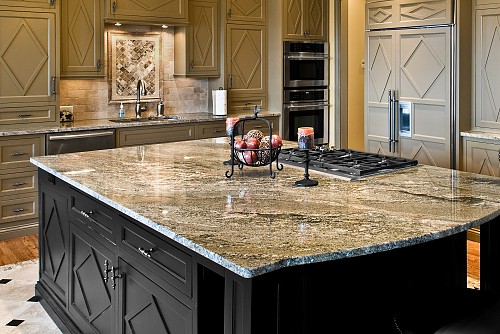DIY Stone Countertop Care: 7 Simple Dos And Don’ts

Who doesn’t appreciate the classy appeal of gorgeous stone countertops? In addition to their beauty, marble, soapstone, quartz, limestone, and granite kitchen counters are durable and hardwearing work surfaces. Treat them with a little bit of TLC and they will be the star of your kitchen for years to come. Just follow these 7 simple dos and don’ts.
- DO be meticulous about wiping spills. Stone countertops are sensitive to contact with any acidic substances, such as wine, orange juice, salad dressing, and acid-based household or personal care products like Drano and nail polish remover. Wipe up spills swiftly, use coasters under bottles and cups placed on the countertop, and move non-food items to another location altogether. (An upper kitchen cabinet is ideal, as it will also keep them securely out of reach of curious toddlers.)
- DO give careful consideration to how you clean your countertops. Avoid homemade natural cleansers that contain vinegar – although these are fantastic for jobs like removing lime scale from a showerhead, they will etch your countertops. Alkaline products and harsh chemicals such as bleach or ammonia, abrasive powders or creams, or scouring pads are equally undesirable. Instead, wash the stone with a solution of warm water and specially formulated stone soap; then dry promptly to prevent ugly streaks.
- DON’T chop or slice directly on stone counters. If you want a countertop that can double as a cutting surface, plump for butcher block instead. Stone is so hard that it can easily dull your chef’s knife. Fine granite or marble will also show scratches; though you may be able to buff these away with Grade 0000 steel wool (don’t moisten before use), you’ll find it safer and simpler to safeguard your beautiful countertop with a cutting board.
- DO protect your counters from cooking pots. Hot pots and pans are capable of causing thermal shock, which may crack stone countertops. This is rare but it happened to a friend of mine, who loved her acres and acres of gorgeous black granite until one day – oops! Her countertop repair was complicated and pricy. Use trivets or hot mats to avoid this danger, as well as to protect the counter material against grit, grease, and small food particles from the bottom of your pans. Trivets that allow airflow underneath are highly recommended when preparing food in a slow cooker, which will expose the counter surface to heat for several hours at a stretch.
- DO seal (most) stone countertops. Applying sealant is a simple procedure that will considerably slow down the rate at which spills are absorbed. As a result, you'll have much more time to wipe up the mess before damage is done. Spilled liquid may even evaporate before it can be absorbed into a sealed stone counter. How often you need to reseal depends on the product type and quality (check manufacturer’s instructions) and the color of your countertops. As a rule, light-colored stone counters require sealing every 1-3 years, while darker ones can go for 3-5 years between treatments. Exceptions are soapstone and quartz countertops; these non-porous materials do not need to be sealed.
- DON’T expect miracles from your stone sealant. Sealant application does reduce stain formation; however, it cannot prevent any kind of scratches or the etching that is a result of contact with acids or alkalis. Sealing stone counters is not what gives the surface a shiny finish, either – that comes from a mechanical polishing process done prior to the installation of your countertop.
- DON’T ever stand on your granite, marble, or quartz countertop. If you need to change an overhead lightbulb or grab your seldom-used turkey platter off a high shelf, climb up a purpose-built stepstool, which can be folded and conveniently stored in the pantry or hall closet when not in use. A stepstool or small kitchen ladder is built to take your weight, but your expensive stone countertop is not. Standing or even sitting on it is likely to cause cracks, not to mention the possibility that you could take a nasty tumble.
Laura Firszt writes for networx.com.
Updated June 12, 2018.
Looking for a Pro? Call us (866) 441-6648

Related Experiences

Glossy New Kitchen Floor Tile … At Last!

Beautiful Tile Backsplash Completes Our Kitchen Remodel



